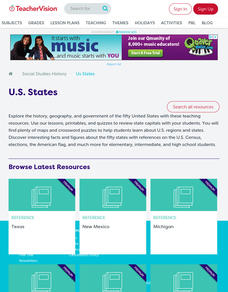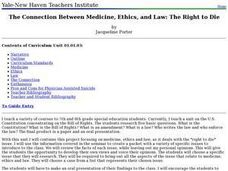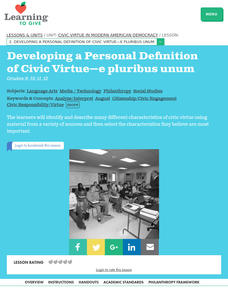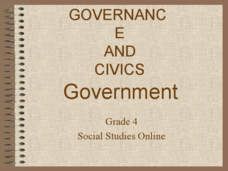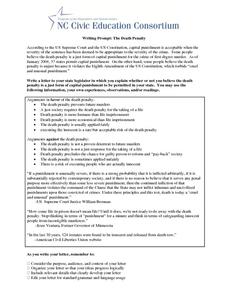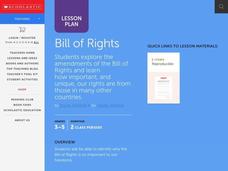Curated OER
U.S. President: Facts
Learners gather information from a chart. They become familiar with the names of the presidents of the United States. They complete a worksheet imbedded in this plan on the many facts associated with the Presidents.
Curated OER
Washington, D. C.: Crossword Puzzle
In this United States history worksheet, students use the 14 clues in order to fill in the crossword puzzle with the appropriate answers pertaining to Washington, D. C.
Curated OER
Religious Expression in Public Schools
Young scholars explore religious expression in the United States. In this religious freedom lesson, students read a handout regarding Religious Freedom Day and other handouts regarding religious expression in public schools. Young...
Curated OER
Are We the People?
Students investigate their elected officials and their roles. For this governmental leadership lesson, students discuss the Constitution and research their elected officials. They also organize the information they find regarding the...
Curated OER
The Connection Between Medicine, Ethics, and Law: The Right to Die
Learners in a special education class examine the United States Constitution. Using the text, they answer five research questions and discuss the amendments that concern medicine, ethics and law of the right to die issue. They develop...
Curated OER
Civic Virtue in Democracy
Students identify and describe characteristics of civic virtue. Following a class discussion, they create their own definitions of civic virtue. They write essays based on their own definitions and formulate conclusions on the state of...
Curated OER
Racism, Discrimination, and the Law
Seventh graders examine the various racism and discrimination faced by various ethnic groups in the United States. In groups, they research the legal system and describe the purpose of the United States Constitution. They review cases...
Curated OER
You and the Law -- Beating the Odds
Middle schoolers examine the rate of institutional racism in the United States. Individually, they write in their journals about how they can make better choices and increase their self-esteem. Using historical documents, they identify...
Curated OER
Justice Demands an End to Segregation, But it Does Not End
Students define human rights and describe how it applies to politics, economics and cultural rights. As a class, they watch a video how the Constitution was made and discuss its purpose. In groups, they present information to the class...
Curated OER
Privacy in the Age of Video Surveillance: This Is Not Your Father's Candid Camera
Eighth graders examine the use of video surveillance in the corporate world and other life situations. In groups, they determine how many times and in what situations they believe they are being watched. They use the Constitution to...
C3 Teachers
Black Genius: How Did Black Genius Help Build American Democracy?
"How did the slavery system undermine the United States' democratic principles?" This question launches a study of how the Preamble to the Declaration of Independence, Article I, Section 2 of the U.S. Constitution, and Article IV,...
Curated OER
The Civil War
Although we currently focus on Abraham Lincoln's positive contributions in creating a more equal society, the truth is that Lincoln was actually a controversial character in his time! After studying the Civil War, give your high...
Curated OER
Mock Election
Here is an excellent PowerPoint presenting loads of information about the US election process. Some of the topics included in the slide show: the reasons voting is important, how to choose a candidate, how the federal, state, and local...
Curated OER
Governance And Civics: Grade 4
This PowerPoint provides elementary students with a basic overview of the structure and workings of the US Government. Students will be introduced to the 3 branches of Federal and State Government, the Bill of Rights, and Amendments 1,...
Carolina K-12
Writing Prompt: The Death Penalty
Is the death penalty unjust because it violates the Eighth Amendment of the United States Constitution, "cruel and unusual punishment"? Or is it just a form of permissible capital punishment? After weighing arguments for and against the...
State Bar of Texas
Marbury v. Madison
Who has the final say in matters dealing with the rules under the United States Constitution? The case Marbury v. Madison brings to light the issue of judicial review. Learners investigate the Supreme Court's opinion in the case with a...
iCivics
Mini-Lesson: Executive Orders
Can the President of the United States pass a law all by himself? Scholars investigate the concept of the executive order in regards to the powers of the presidency. They use current issues and events to monitor media bias while also...
Teaching Tolerance
Using Photographs to Teach Social Justice | Confronting Unjust Laws
The right to peacefully assembly to protest injustice is a key element of the First Amendment to the United States Constitution. Class members are asked to analyze two photographs of people confronting what they consider to be unjust...
Curated OER
Bill of Rights Day (December 15th)
On December 15, 1791, the ratification of the first ten amendments to the Constitution of the UnitedStates of American by three-quarters of the states took place. These were subsequently incorporated into the Constitution and became...
Curated OER
The First (and Last) Words
What does "freedom of speech" mean to your class, especially in the context of Internet communications? In round-table discussion format, middle and high schoolers address the issues discussed in "State Legislatures Across U.S. Plan to...
PBS
President Theodore Roosevelt: Foreign Policy Statesman or Bully?
Can a negative perception of a president's foreign policy harm his or her historical legacy? A project that winds the clock back to the date of Theodore Roosevelt's death puts students at the editorial desk of a fictional newspaper....
Curated OER
Bill of Rights
Students discuss the government as a whole and then each amendment is examined. They complete a Bill of Rights test in groups or on their own. Answers are gone over in class and discussion is encouraged.
Center for Civic Education
The Power of Nonviolence: Rosa Parks: A Quest for Equal Protection Under the Law
Teach young historians about the historical legacy of Rosa Parks with a multi-faceted lesson plan. Pupils follow stations and use journals to explore prominent events, analyze primary resource documents, and engage in interesting...
Constitutional Rights Foundation
Special Order 40
The city of Los Angeles' 1979 Special Order 40 states: "LAPD officers shall not initiate police action with the objective of discovering the alien status of a person." After reading a fact sheet that details the history of Special Order...


